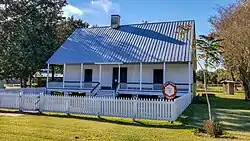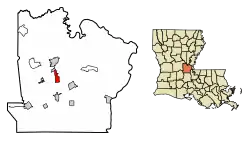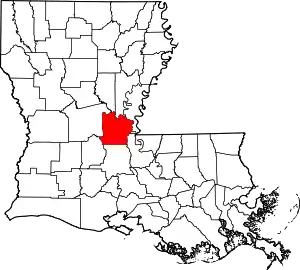Mansura, Louisiana
Mansura is a town in Avoyelles Parish, Louisiana, United States. The population was 1,419 at the 2010 census.[2] Mansura is home to the Cochon de Lait Festival, and claims to be the Cochon de Lait capital of the world.
Mansura, Louisiana | |
|---|---|
Town | |
 The Desfossé House dates to 1790. | |
 Location of Mansura in Avoyelles Parish, Louisiana. | |
.svg.png.webp) Location of Louisiana in the United States | |
| Coordinates: 31°03′33″N 92°02′55″W | |
| Country | United States |
| State | Louisiana |
| Parish | Avoyelles |
| Government | |
| • Mayor | Kenneth Pickett, Sr. (D) |
| Area | |
| • Total | 2.85 sq mi (7.39 km2) |
| • Land | 2.85 sq mi (7.39 km2) |
| • Water | 0.00 sq mi (0.00 km2) |
| Elevation | 75 ft (23 m) |
| Population (2020) | |
| • Total | 1,320 |
| • Density | 462.51/sq mi (178.57/km2) |
| Time zone | UTC-6 (CST) |
| • Summer (DST) | UTC-5 (CDT) |
| Area code | 318 |
| FIPS code | 22-48400 |
Louisiana 4-H Museum
The city of Mansura is the home of the Louisiana 4-H Museum and Hall of Fame. Opened in 2009, this museum has a complete history of 4-H in Louisiana from 1908 to present day. The museum boasts its Camp Grant Walker's Old Dance Pavilion look of its video screen and benches looking like the Greek Theatre seating. The museum also boasts its hall of fame with over 100 inductees and at least one from all of the 64 parishes of Louisiana.
Geography
Mansura is located at 31°3′33″N 92°2′55″W (31.059242, -92.048660).[3] According to the United States Census Bureau, the town has a total area of 2.7 square miles (7.0 km2), all land.[2]
Demographics
| Census | Pop. | Note | %± |
|---|---|---|---|
| 1890 | 144 | — | |
| 1900 | 408 | 183.3% | |
| 1910 | 695 | 70.3% | |
| 1920 | 829 | 19.3% | |
| 1930 | 1,057 | 27.5% | |
| 1940 | 1,138 | 7.7% | |
| 1950 | 1,439 | 26.4% | |
| 1960 | 1,579 | 9.7% | |
| 1970 | 1,699 | 7.6% | |
| 1980 | 2,074 | 22.1% | |
| 1990 | 1,601 | −22.8% | |
| 2000 | 1,573 | −1.7% | |
| 2010 | 1,419 | −9.8% | |
| 2020 | 1,320 | −7.0% | |
| U.S. Decennial Census[4] | |||
2020 census
| Race | Number | Percentage |
|---|---|---|
| White (non-Hispanic) | 389 | 29.47% |
| Black or African American (non-Hispanic) | 809 | 61.29% |
| Native American | 14 | 1.06% |
| Other/Mixed | 96 | 7.27% |
| Hispanic or Latino | 12 | 0.91% |
As of the 2020 United States census, there were 1,320 people, 623 households, and 288 families residing in the town.
2010 census
As of the census[6] of 2010, there were 1,419 people, 591 households, and 343 families residing in the town. The racial makeup of the town was 37.6% White, 56.7% African American, 1.7% Native American, 0.1% Asian, 0.1% Native Hawaiian or Pacific Islander, 0.5% from other races, and 3.2% from two or more races. Hispanic or Latino of any race were 1.3% of the population.
There were 591 households, out of which 24.2% had children under the age of 18 living with them, 25.9% were married couples living together, 27.4% had a female householder with no husband present, and 42% were non-families. 39.4% of all households were made up of individuals, and 20.3% had someone living alone who was 65 years of age or older. The average household size was 2.28 and the average family size was 3.03.
In the town, the population was spread out, with 28.2% under the age of 18, 9.1% from 18 to 24, 25.2% from 25 to 44, 18.9% from 45 to 64, and 18.5% who were 65 years of age or older. The median age was 36 years. For every 100 females, there were 85.3 males. For every 100 females age 18 and over, there were 75.9 males.
The median income for a household in the town was $16,836, and the median income for a family was $19,612. Males had a median income of $26,250 versus $15,972 for females. The per capita income for the town was $11,473. About 34.4% of families and 40.4% of the population were below the poverty line, including 55.7% of those under age 18 and 27.6% of those age 65 or over.
Notable people
- Felix Moncla, U.S. Air Force pilot who disappeared in 1953.
- Johnathin E. Lewis IV, basketball player in the National Association of Intercollegiate Athletics (NAIA). Lewis played for Kansas Christian College in Overland Park, Kansas and Faith Baptist Bible School in Ankeny, Iowa. He was raised in Mansura. (May 2017)
- Vincent Simmons, born and raised in Mansura, is serving a 100-year sentence at Louisiana State Prison for attempted aggravated rape. Supporters are trying to have his case appealed because of problems of due process in the charges and his 1977 trial; exculpatory evidence was withheld by the prosecution. He was one of six men featured in the Academy Award-nominated film The Farm: Angola, USA (1997) and is the sole subject of its successor Shadows of Doubt: Vincent Simmons (2007).
Mayors of Mansura
- Captain J.C. Joffrion, 1860
- Dr. Jules Charles Desfossé, 1861
- Nelson Durand, 1865
- David Siess, 1874
- Valery Coco, 1876
- F.J.C. Monnin, 1878
- Leandré François Roy, elected June 1878 (died November 1878)[8]
- David Siess, 1879
- F.J.C. Monnin, 1880
- David Siess, 1881–82
- Pascalis D. Roy, 1884 (son of LF Roy)
- David Siess, June 1884
- Theo Forest, 1885
- David Siess, 1886–90
References
- "2020 U.S. Gazetteer Files". United States Census Bureau. Retrieved March 20, 2022.
- "Geographic Identifiers: 2010 Demographic Profile Data (G001): Mansura town, Louisiana". U.S. Census Bureau, American Factfinder. Archived from the original on February 12, 2020. Retrieved May 16, 2013.
- "US Gazetteer files: 2010, 2000, and 1990". United States Census Bureau. February 12, 2011. Retrieved April 23, 2011.
- "Census of Population and Housing". Census.gov. Retrieved June 4, 2015.
- "Explore Census Data". data.census.gov. Retrieved December 29, 2021.
- "U.S. Census website". United States Census Bureau. Retrieved January 31, 2008.
- Biographical and Historical Memoirs of Northwest Louisiana: Comprising a Large Fund of Biography of Actual Residents, and an Interesting Historical Sketch of 13 Counties. Southern Publishing Company. January 1890.
- Roy, Sheldon. "Hon. Léandre François Roy (1827-1878)". My Louisiana Family. Retrieved October 30, 2021.
